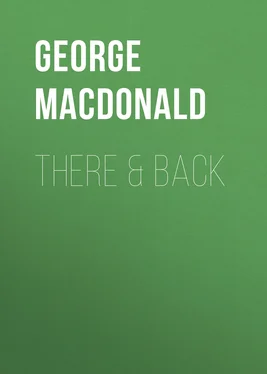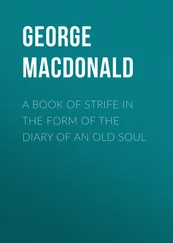George MacDonald - There & Back
Здесь есть возможность читать онлайн «George MacDonald - There & Back» — ознакомительный отрывок электронной книги совершенно бесплатно, а после прочтения отрывка купить полную версию. В некоторых случаях можно слушать аудио, скачать через торрент в формате fb2 и присутствует краткое содержание. Жанр: foreign_prose, foreign_religion, foreign_antique, на английском языке. Описание произведения, (предисловие) а так же отзывы посетителей доступны на портале библиотеки ЛибКат.
- Название:There & Back
- Автор:
- Жанр:
- Год:неизвестен
- ISBN:нет данных
- Рейтинг книги:4 / 5. Голосов: 1
-
Избранное:Добавить в избранное
- Отзывы:
-
Ваша оценка:
- 80
- 1
- 2
- 3
- 4
- 5
There & Back: краткое содержание, описание и аннотация
Предлагаем к чтению аннотацию, описание, краткое содержание или предисловие (зависит от того, что написал сам автор книги «There & Back»). Если вы не нашли необходимую информацию о книге — напишите в комментариях, мы постараемся отыскать её.
There & Back — читать онлайн ознакомительный отрывок
Ниже представлен текст книги, разбитый по страницам. Система сохранения места последней прочитанной страницы, позволяет с удобством читать онлайн бесплатно книгу «There & Back», без необходимости каждый раз заново искать на чём Вы остановились. Поставьте закладку, и сможете в любой момент перейти на страницу, на которой закончили чтение.
Интервал:
Закладка:
George MacDonald
There & Back
NOTE
Some of the readers of this tale will be glad to know that the passage with which it ends is a real dream; and that, with but three or four changes almost too slight to require acknowledging, I have given it word for word as the friend to whom it came set it down for me.
CHAPTER I. FATHER, CHILD, AND NURSE
It would be but stirring a muddy pool to inquire—not what motives induced, but what forces compelled sir Wilton Lestrange to marry a woman nobody knew. It is enough to say that these forces were mainly ignoble, as manifested by their intermittent character and final cessation. The mésalliance occasioned not a little surprise, and quite as much annoyance, among the county families,—failing, however, to remind any that certain of their own grandmothers had been no better known to the small world than lady Lestrange. It caused yet more surprise, though less annoyance, in the clubs to which sir Wilton had hitherto been indebted for help to forget his duties: they set him down as a greater idiot than his friends had hitherto imagined him. For had he not been dragged to the altar by a woman whose manners and breeding were hardly on the level of a villa in St. John’s Wood? Did any one know whence she sprang, or even the name which sir Wilton had displaced with his own? But sir Wilton himself was not proud of his lady; and if the thing had been any business of theirs, it would have made no difference to him; he would none the less have let them pine in their ignorance. Did not his mother, a lady less dignified than eccentric, out of pure curiosity beg enlightenment concerning her origin, and receive for answer from the high-minded baronet, “Madam, the woman is my wife!”—after which the prudent dowager asked no more questions, but treated her daughter-in-law with neither better nor worse than civility. Sir Wilton, in fact, soon came to owe his wife a grudge that he had married her, and none the less that at the time he felt himself of a generosity more than human in bestowing upon her his name. Creation itself, had he ever thought of it, would have seemed to him a small thing beside such a gift!
That Robina Armour, after experience of his first advances, should have at last consented to marry sir Wilton Lestrange, was in no sense in her favour, although after a fashion she was in love with him—in love, that is, with the gentleman of her own imagining whom she saw in the baronet; while the baronet, on his part, was what he called in love with what he called the woman . As he was overcome by her beauty, so was she by his rank—an idol at whose clay feet is cast many a spiritual birthright—and as mean a deity as any of man’s device. But the blacksmith’s daughter was in many respects, notwithstanding, a woman of good sense, with much real refinement, and a genuine regard for rectitude. Although sir Wilton had never loved her with what was best in him, it was not in spite of what was best in him that he fell in love with her. Had his better nature been awake, it would have justified the bond, and been strengthened by it.
Lady Lestrange’s father was a good blacksmith, occasionally drunk in his youth, but persistently sober now in his middle age; a long-headed fellow, with reach and quality in the prudence which had long ceased to appear to him the highest of virtues. At one period he had accounted it the prime duty of existence to take care of oneself; and so much of this belief had he communicated to his younger daughter, that she deported herself so that sir Wilton married her—with the result that, when Death knocked at her door, she welcomed him to her heart. The first cry of her child, it is true, made her recall the welcome, but she had to go with him, notwithstanding, when the child was but an hour old.
Not one of her husband’s family was in the house when she died. Sir Wilton himself was in town, and had been for the last six months, preferring London and his club to Mortgrange and his wife. When a telegram informed him that she was in danger, he did go home, but when he arrived, she had been an hour gone, and he congratulated himself that he had taken the second train.
There had been betwixt them no approach to union. When what sir Wilton called love had evaporated, he returned to his mire, with a resentful feeling that the handsome woman—his superior in everything that belongs to humanity—had bewitched him to his undoing. The truth was, she had ceased to charm him. The fault was not in her; it lay in the dulled eye of the swiftly deteriorating man, which grew less and less capable of seeing things as they were, and transmitted falser and falser impressions of them. The light that was in him was darkness. The woman that might have made a man of him, had there been the stuff, passed from him an unprized gift, a thing to which he made Hades welcome.
It was decent, however, not to parade his relief. He retired to the library, lit a cigar, and sat down to wish the unpleasant fuss of the funeral over, and the house rid of a disagreeable presence. Had the woman died of a disease to which he might himself one day have to succumb, her death might, as he sat there, have chanced to raise for an instant the watery ghost of an emotion; but, coming as it did, he had no sympathetic interest in her death any more than in herself. Lolling in the easiest of chairs, he revolved the turns of last night’s play, until it occurred to him that he might soon by a second marriage take amends of his neighbours for their disapprobation of his first. So pleasant was the thought that, brooding upon it, he fell asleep.
He woke, looked, rubbed his eyes, stared, rubbed them again, and stared. A woman stood in front of him—one he had surely seen!—no, he had never seen her anywhere! What an odd, inquiring, searching expression in her two hideous black eyes! And what was that in her arms—something wrapt in a blanket?
The message in the telegram recurred to him: there must have been a child! The bundle must be the child! Confound the creature! What did it want?
“Go away,” he said; “this is not the nursery!”
“I thought you might like to look at the baby, sir!” the woman replied.
Sir Wilton stared at the blanket.
“It might comfort you, I thought!” she went on, with a look he felt to be strange. Her eyes were hard and dry, red with recent tears, and glowing with suppressed fire.
Sir Wilton was courteous to most women, especially such as had no claim upon him, but cherished respect for none. It was odd therefore that he should now feel embarrassed. From some cause the machinery of his self-content had possibly got out of gear; anyhow no answer came ready. He had not the smallest wish to see the child, but was yet, perhaps, unwilling to appear brutal. In the meantime, the woman, with gentle, moth-like touch, was parting and turning back the folds of the blanket, until from behind it dawned a tiny human face, whose angel was suppliant, it may be, for the baptism of a father’s first gaze.
The woman held out the child to sir Wilton, as if expecting him to take it. He started to his feet, driving the chair a yard behind him, stuck his hands in his pockets, and, with a face of disgust, cried—
“Great God! take the creature away.”
But he could not lift his eyes from the face nested in the blanket. It seemed to fascinate him. The woman’s eyes flared, but she did not speak.
“Uglier than sin!” he half hissed, half growled. “—I suppose the animal is mine, but you needn’t bring it so close to me! Take it away—and keep it away. I will send for it when I want it—which won’t be in a hurry! My God! How hideous a thing may be, and yet human!”
“He is as God made him!” remarked the nurse, quietly for very wrath.
Читать дальшеИнтервал:
Закладка:
Похожие книги на «There & Back»
Представляем Вашему вниманию похожие книги на «There & Back» списком для выбора. Мы отобрали схожую по названию и смыслу литературу в надежде предоставить читателям больше вариантов отыскать новые, интересные, ещё непрочитанные произведения.
Обсуждение, отзывы о книге «There & Back» и просто собственные мнения читателей. Оставьте ваши комментарии, напишите, что Вы думаете о произведении, его смысле или главных героях. Укажите что конкретно понравилось, а что нет, и почему Вы так считаете.












